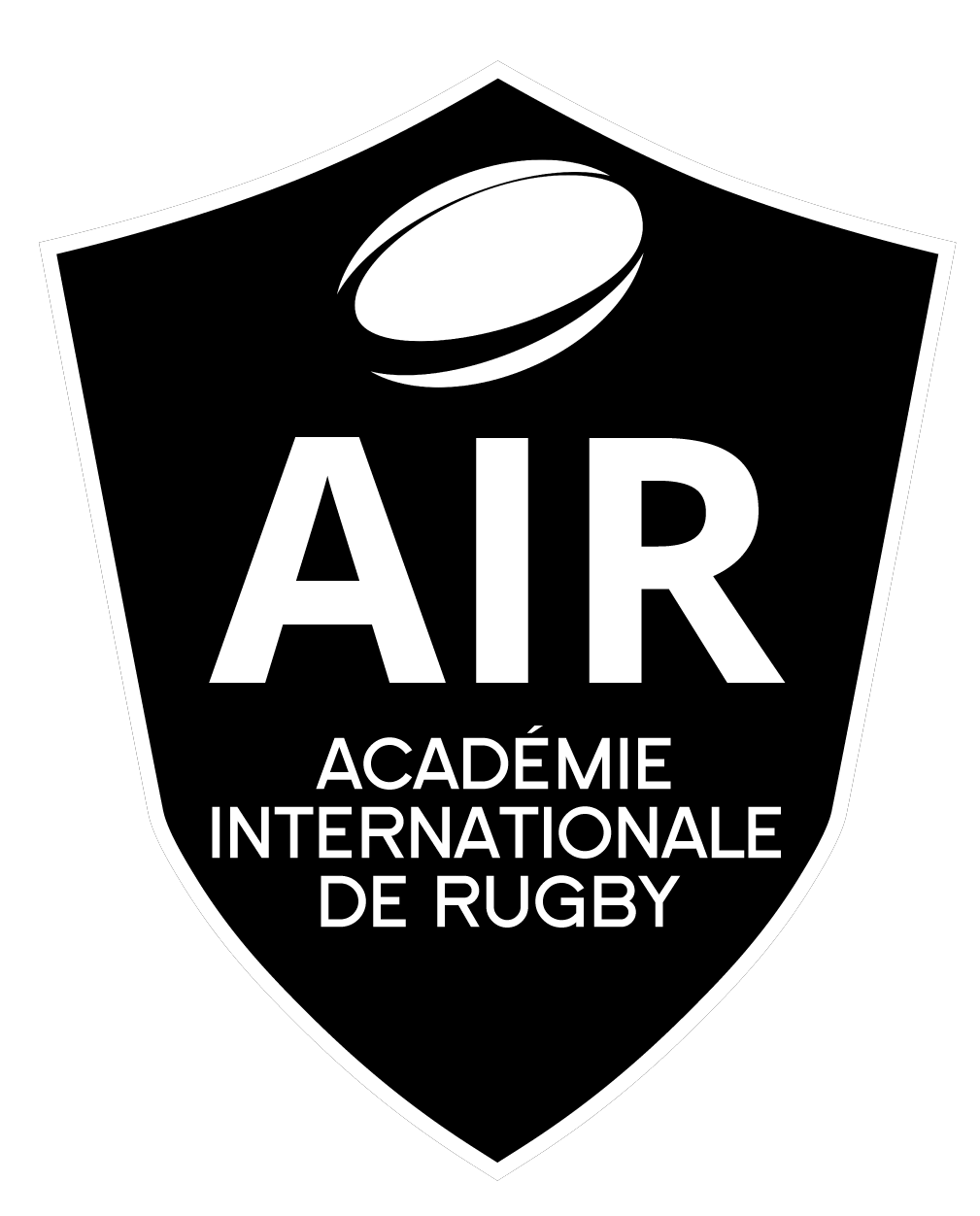HIGH-LEVEL RUGBY CAMPS
Need to progress and increase your level of play? Each program in our
The
AIR Top Coaches
coaches are chosen from among rugby’s current and former elite, offering participants the opportunity to learn directly from the most competent in the world of rugby. The programs proposed below may be revised according to the different levels of Académie Internationale de Rugby (AIR) trainees. “The aim is for trainees to experience training sessions similar to those of professional players. Academy trainees are trained
100% Female Performance Camp - CREPS Toulouse
Toulouse,
from 15/07/2026 at
21/07/2026

Sprinting skills and techniques and posture
Speed and frequency work
Motor skills and agility, support work
Power and explosiveness
Reinvestment and transfer to rugby
Muscle strengthening and core training
Strength training with additional loads and introduction to weightlifting
Injury prevention and recovery
Individualized functional assessment
FORWARD
Scrum, role and technique – safety, posture and performance
Touch, role and technique, introduction to lifting and constructing the throw
Performing in the lift, understanding the triggers
Speed, movement and speed in the air, throwing in the three zones
Receiving the throwback, reading the ball’s trajectory, communicating, lifting on the throwback
Heeling, linking by line and coordinating the push.
BACKS
Footwork (drop, grazing kick, occupying kick, candle)
Occupying and reoccupying the deep plane
Receiving a high ball on the spot and moving forward
Line-play passing (crossing, jumping, redoubling, lifting, off-load, 45-degree pass)
Using the second curtain of attack
Duel and tools of the advance (activity of the standing player)
Ruck and conservation (carrier, support)
Activity of the player on the ground
Issue of the return to play
Defensive framing
Tackle and get up and counter ruck
Return to play and contest
Different types of pass
Reading and understanding the game: move forward where it’s easy
Keeping speed in the game
Positioning, adapting and communicating support
Creating open spaces and using them as quickly as possible
Positioning and repositioning to threaten all spaces
Willingness not to stop the ball
Understanding and managing encounters
Approach and strategic importance
Introduction to mental preparation
Controlling individual and collective emotional variations
Setting goals for a match and a period
Self-determination
Building post-training and post-meeting routines
Lifestyle hygiene for top-level athletes
Nutrition for performance
Performance Camp - CREPS Toulouse
Toulouse,
from 07/07/2026 at
13/07/2026
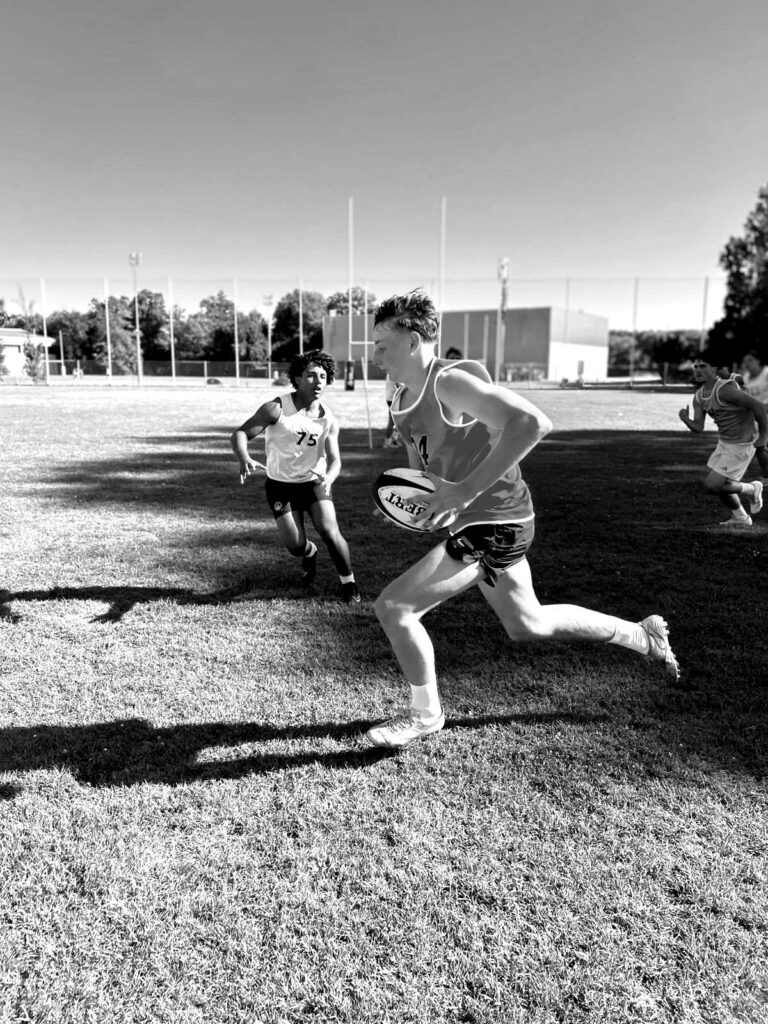
Sprinting skills and techniques and posture
Speed and frequency work
Motor skills and agility, support work
Power and explosiveness
Reinvestment and transfer to rugby
Muscle strengthening and core training
Strength training with additional loads and introduction to weightlifting
Injury prevention and recovery
Individualized functional assessment
FORWARD
Scrum, role and technique – safety, posture and performance
Touch, role and technique, introduction to lifting and constructing the throw
Performing in the lift, understanding the triggers
Speed, movement and speed in the air, throwing in the three zones
Receiving the throwback, reading the ball’s trajectory, communicating, lifting on the throwback
Heeling, linking by line and coordinating the push.
BACKS
Footwork (drop, grazing kick, occupying kick, candle)
Occupying and reoccupying the deep plane
Receiving a high ball on the spot and moving forward
Line-play passing (crossing, jumping, redoubling, lifting, off-load, 45-degree pass)
Using the second curtain of attack
Duel and tools of the advance (activity of the standing player)
Ruck and conservation (carrier, support)
Activity of the player on the ground
Issue of the return to play
Defensive framing
Tackle and get up and counter ruck
Return to play and contest
Different types of pass
Reading and understanding the game: move forward where it’s easy
Keeping speed in the game
Positioning, adapting and communicating support
Creating open spaces and using them as quickly as possible
Positioning and repositioning to threaten all spaces
Willingness not to stop the ball
Understanding and managing encounters
Approach and strategic importance
Introduction to mental preparation
Controlling individual and collective emotional variations
Setting goals for a match and a period
Self-determination
Building post-training and post-meeting routines
Lifestyle hygiene for top-level athletes
Nutrition for performance
Skills Development Camp - CREPS Toulouse
Toulouse,
from 15/07/2026 at
21/07/2026
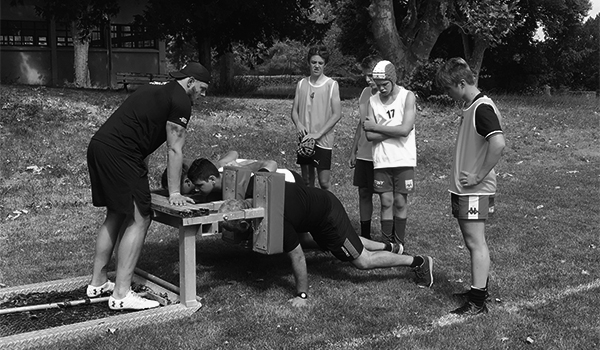
Full board for 7 days / 6 nights
Location: Carnac, France
*Payment in 3 or 5 instalments
Sprinting skills and techniques and posture
Speed and frequency work
Motor skills and agility, support work
Power and explosiveness
Reinvestment and transfer to rugby
Muscle strengthening and core training
Strength training with additional loads and introduction to weightlifting
Injury prevention and recovery
Individualized functional assessment
FORWARD
Scrum, role and technique – safety, posture and performance
Touch, role and technique, introduction to lifting and constructing the throw
Performing in the lift, understanding the triggers
Speed, movement and speed in the air, throwing in the three zones
Receiving the throwback, reading the ball’s trajectory, communicating, lifting on the throwback
Heeling, linking by line and coordinating the push.
BACKS
Footwork (drop, grazing kick, occupying kick, candle)
Occupying and reoccupying the deep plane
Receiving a high ball on the spot and moving forward
Line-play passing (crossing, jumping, redoubling, lifting, off-load, 45-degree pass)
Using the second curtain of attack
Duel and tools of the advance (activity of the standing player)
Ruck and conservation (carrier, support)
Activity of the player on the ground
Issue of the return to play
Defensive framing
Tackle and get up and counter ruck
Return to play and contest
Different types of pass
Reading and understanding the game: move forward where it’s easy
Keeping speed in the game
Positioning, adapting and communicating support
Creating open spaces and using them as quickly as possible
Positioning and repositioning to threaten all spaces
Willingness not to stop the ball
Understanding and managing encounters
Approach and strategic importance
Introduction to mental preparation
Controlling individual and collective emotional variations
Setting goals for a match and a period
Self-determination
Building post-training and post-meeting routines
Lifestyle hygiene for top-level athletes
Nutrition for performance
Belluno, Italy
Belluno,
from 28/03/2026 at
30/03/2026
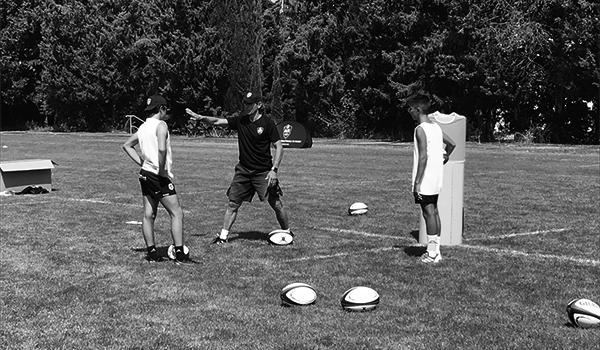
Sprinting skills and techniques and posture
Speed and frequency work
Motor skills and agility, support work
Power and explosiveness
Reinvestment and transfer to rugby
Muscle strengthening and core training
Strength training with additional loads and introduction to weightlifting
Injury prevention and recovery
Individualized functional assessment
FORWARD
Scrum, role and technique – safety, posture and performance
Touch, role and technique, introduction to lifting and constructing the throw
Performing in the lift, understanding the triggers
Speed, movement and speed in the air, throwing in the three zones
Receiving the throwback, reading the ball’s trajectory, communicating, lifting on the throwback
Heeling, linking by line and coordinating the push.
BACKS
Footwork (drop, grazing kick, occupying kick, candle)
Occupying and reoccupying the deep plane
Receiving a high ball on the spot and moving forward
Line-play passing (crossing, jumping, redoubling, lifting, off-load, 45-degree pass)
Using the second curtain of attack
Duel and tools of the advance (activity of the standing player)
Ruck and conservation (carrier, support)
Activity of the player on the ground
Issue of the return to play
Defensive framing
Tackle and get up and counter ruck
Return to play and contest
Different types of pass
Reading and understanding the game: move forward where it’s easy
Keeping speed in the game
Positioning, adapting and communicating support
Creating open spaces and using them as quickly as possible
Positioning and repositioning to threaten all spaces
Willingness not to stop the ball
Understanding and managing encounters
Approach and strategic importance
Introduction to mental preparation
Controlling individual and collective emotional variations
Setting goals for a match and a period
Self-determination
Building post-training and post-meeting routines
Lifestyle hygiene for top-level athletes
Nutrition for performance
Carnac Performance Camp
Carnac,
from 19/10/2025 at
25/10/2025
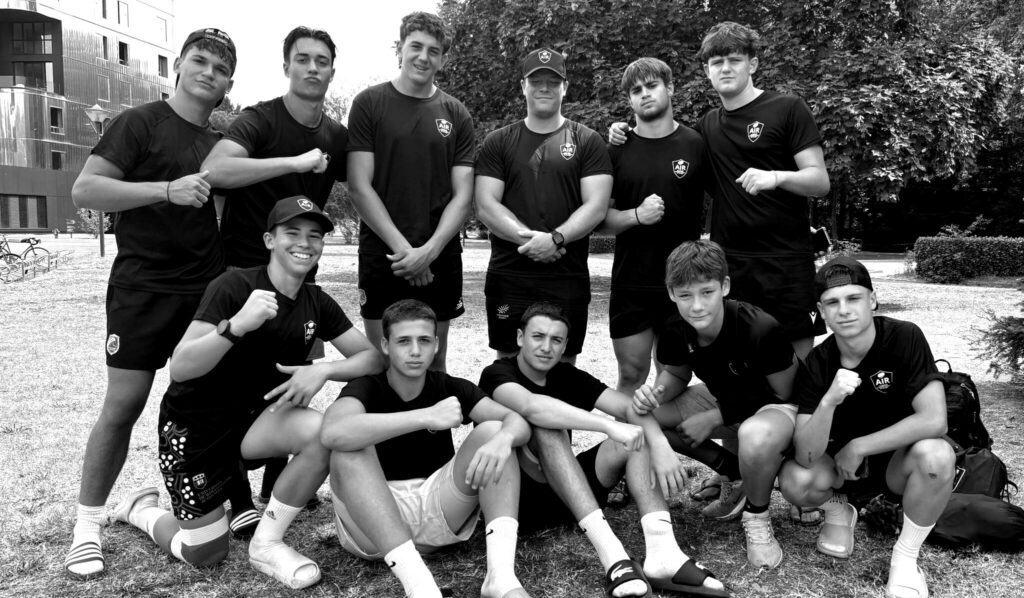
Sprinting skills and techniques and posture
Speed and frequency work
Motor skills and agility, support work
Power and explosiveness
Reinvestment and transfer to rugby
Muscle strengthening and core training
Strength training with additional loads and introduction to weightlifting
Injury prevention and recovery
Individualized functional assessment
FORWARD
Scrum, role and technique – safety, posture and performance
Touch, role and technique, introduction to lifting and constructing the throw
Performing in the lift, understanding the triggers
Speed, movement and speed in the air, throwing in the three zones
Receiving the throwback, reading the ball’s trajectory, communicating, lifting on the throwback
Heeling, linking by line and coordinating the push.
BACKS
Footwork (drop, grazing kick, occupying kick, candle)
Occupying and reoccupying the deep plane
Receiving a high ball on the spot and moving forward
Line-play passing (crossing, jumping, redoubling, lifting, off-load, 45-degree pass)
Using the second curtain of attack
Duel and tools of the advance (activity of the standing player)
Ruck and conservation (carrier, support)
Activity of the player on the ground
Issue of the return to play
Defensive framing
Tackle and get up and counter ruck
Return to play and contest
Different types of pass
Reading and understanding the game: move forward where it’s easy
Keeping speed in the game
Positioning, adapting and communicating support
Creating open spaces and using them as quickly as possible
Positioning and repositioning to threaten all spaces
Willingness not to stop the ball
Understanding and managing encounters
Approach and strategic importance
Introduction to mental preparation
Controlling individual and collective emotional variations
Setting goals for a match and a period
Self-determination
Building post-training and post-meeting routines
Lifestyle hygiene for top-level athletes
Nutrition for performance
VIDEO CLIPS FROM PREVIOUS CAMPS
Course in Belluno, Italy – €350
- 3-day half-board course in Belluno, Italy
- Access to facilities related to the internship program
- Access to personal profile on the platform with internship report
- Professional community with coach videos
- Post-course technical and tactical evaluation
- A detailed job evaluation of strengths, weaknesses and main areas for development
- AIR T-shirt, cap, water bottle
- Honorary diploma
- Technical follow-up binder containing a course summary
Internship in Carnac, France – €900
- 7 days / 6 nights full board at Carnac
- Trainees born between 2008 and 2012
- Accommodation at Hotel Les Alignements ( 3 stars )
- Access to facilities related to the internship program
- Access to personal profile on the platform with internship report
- Professional community with coach videos
- Post-course technical and tactical evaluation
- A detailed job evaluation of strengths, weaknesses and main areas for development
- AIR T-shirt, cap, water bottle
- Honorary diploma
- Technical follow-up binder containing a course summary
Performance Camp in Toulouse, France – €1045
- 7-day / 6-night course, full board in a double room
- Trainees born between 2009 and 2011
- Accommodation at CREPS Toulouse
- Transfer to and from the airport or train station > CREPS with a dedicated shuttle bus
- Lecture courses (video analysis, lectures, mental preparation, nutrition)
- Access to facilities related to the internship program
- Access to personal profile on the platform with internship report
- Professional community with coach videos
- Post-course technical and tactical evaluation
- A detailed job evaluation of strengths, weaknesses and main areas for development
- AIR T-shirt, cap, water bottle
- Honorary diploma
- Technical follow-up binder containing a course summary
Performance Camp in Toulouse, France – €1045
- 7-day / 6-night course, full board in a double room
- Trainees born between 2012 and 2013
- Accommodation at CREPS Toulouse
- Transfer to and from the airport or train station > CREPS with a dedicated shuttle bus
- Lecture courses (video analysis, lectures, mental preparation, nutrition)
- Access to facilities related to the internship program
- Access to personal profile on the platform with internship report
- Professional community with coach videos
- Post-course technical and tactical evaluation
- A detailed job evaluation of strengths, weaknesses and main areas for development
- AIR T-shirt, cap, water bottle
- Honorary diploma
- Technical follow-up binder containing a course summary
Each player will be assigned a coach who specializes in that position, usually a former or current professional or even international player. He or she will work in coordination with a general coach (1 coach for every 12 players), providing the player with a detailed understanding of his or her qualities, progress and the challenges associated with his or her position during the course of his or her development plan.
Personalized follow-up is offered to players, on request, for one year via videoconference, where they can continue their exchanges with the coaches.
